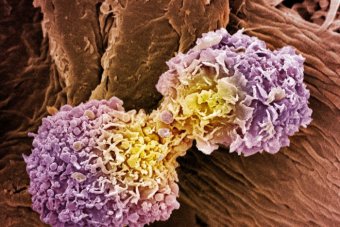
Stress acts as a “fertiliser” for cancer, helping it to spread through the body’s lymphatic system, according to a study on mice.
The research, led by Australian scientists, also showed that a well-known blood pressure drug may reduce the risk of the cancer spreading.
In a paper published today in Nature Communications, those scientists report how exposure to chronic stress not only increases the number of lymphatic vessels draining from the tumour, but increase flow in existing vessels.
“So not only do you get new freeways out of the tumour but the speed limit is increased and so the tumour cells can flow out of the tumour much more rapidly,” said one of the study’s authors, Dr Erica Sloan from the Monash Institute of Pharmaceutical Sciences.
Previous studies have shown that stress hormones such as adrenaline and noradrenaline can influence blood vessel formation, which is important in the spread of disease.
The lymphatic system — a vital part of the immune system that comprises a network of tubes throughout the body that drains fluid from tissues back into the bloodstream — can also promote the spread of cancer, but whether this can be influenced by stress had been unclear up to now.
“That was one of the key findings of this study, because we can identify that it’s adrenaline acting through particular receptors on cells, and that tells us what drugs we should use to block these pathways,” Dr Sloan said.
To test this, researchers used a drug called propranolol to block the action of adrenaline in the stressed mice.
A type of drug called a beta-blocker, propranolol has been used widely for nearly half a century to treat blood pressure.
When the stressed mice were treated with the drug, it stopped their stress hormones from remodelling the lymph vessels inside the tumour, and reduced the risk of the cancer spreading through the lymph nodes.
Because propranolol and other beta-blockers are already in widespread use around the world, Dr Sloan and her colleagues looked at data from nearly 1,000 breast cancer patients in Italy to see if any were taking beta-blockers and, if so, whether it showed any effect on their risk of metastases.
“When tracked over about seven years, it turned out that those that had been taking beta-blockers also showed far less evidence of tumour cells moving into the lymph nodes and then disseminating to other organs like the lung, so it provides clinical support for what we see in the mice,” said Dr Sloan.
Pilot study on women with breast cancer
The team are now conducting a pilot study in a group of women with breast cancer to see if treatment with propranolol will reduce their risk of the tumour spreading to other parts of the body.
Dr Sloan said a link between chronic stress and cancer spread — but not new cancer — has now been shown in several studies, particularly in individuals with early stage disease, which highlights an opportunity to reduce both stress and the risk of metastases or secondary tumours.
“Not for a minute are we suggesting that someone who’s just been diagnosed with cancer should not be stressed, because that would have to be one of the most stressful situations,” she said.
“But rather how do we look after cancer patients, because this suggests that stress not only affects patient wellbeing but also gets into the body and affects how the tumour progresses.”
Medical oncologist Associate Professor Elgene Lim, from the Garvan Institute, said the study provided a possible mechanism to explain the observation from many previous studies that stress was associated with poorer outcomes in cancer.
“What also makes this study exciting is the affordability of [possible] interventions,” said Professor Lim, who was not involved in the research.
But, he emphasised, the blood pressure drug needed to be tested in clinical trials to see if it reduced the spread of cancer in humans.
